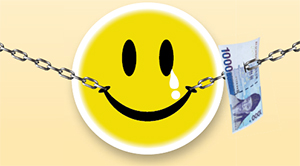
“On April 27 (2016), A man came to me while I was working. He asked whether he has bad breath or not, even though he will eat a candy when he kisses me. He looked at me up and down, saying things like that. I felt as if I were naked at the checkout counter. I really wanted to die during those 10 minutes because of the humiliation I felt. However, a male supervisor did nothing to protect me but bluntly said that I should go the toilet.” Park Su-mi, who is working at the checkout counter of the supermarket, said this speech at a press conference which disclosed the problems workers face at E-Mart, one of the supermarkets in Korea, on May 3, 2016. That experience became a trauma for her, and she visited a psychiatrist because of anxiety and insomnia she felt after that experience.
According to Media Today, an anonymous worker, a security staff who is working at Incheon International Airport, was insulted by a passenger. As the officer restricted the passenger to carry red ginseng extract, which was a liquid gel, the passenger poured all the liquid on the security device. Then the passenger demanded the workers to drink all those things. Another worker at Incheon International Airport was sexually harassed by a customer during a security check. Even though the worker was shocked and felt humiliated, he or she had to work continually, looking at the long line of the people who were waiting to get security checked.
Unfortunately, these two situations are very common in current Korean society. A number of workers, especially in the service industry, are suffering emotionally. However, they have to endure or hide their true emotions while working. We call those situations “emotional labor”. Why has “emotional labor” occurred in Korean society? What kinds of mental and physical pain are workers experiencing? How can we solve these problems? The UOS Times will try to find the answers to these questions in this article.
Causes of Emotional Labor
Development of the Service Industry
The concept, “emotional labor”, first appeared in the book, The Managed Heart, which was published in 1983. Arlie Russell Hochschild, the author of this book, defined “emotional labor” as one of the labors which accompanies control and suppression of one’s own emotion. The workers must hide their negative emotions and act kindly to customers through polite speaking, facial expressions, and gestures.
Hochschild also mentioned that emotional labor occurred due to industry acceleration and an increase in the number of workers in the service industry. Unlike primary and secondary industries where people can earn a living through self-sufficiency, deals are essential factors in tertiary industries. In tertiary industries, a deal consists of people who provide services and people who buy the services. For more profits, it is necessary for providers to offer high-quality services to leave a good impression. In this process, the service-producers must hide their own emotions and smile, even when a customer acts rudely or arrogantly. Emotional labor started from this phenomenon. That is, emotional labor started from the process of gaining more profits during the increase of tertiary industries in the capitalism system.
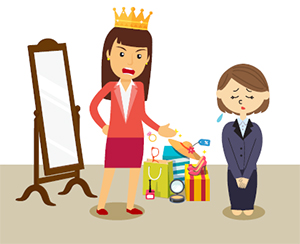
Customers’ Minds: “We Are the King”
Another cause of emotional labor can be rooted in customers’ fallacious minds. Some customers tend to think they are much more superior to workers in the service industry.
In eastern countries, such as Korea, Japan, and China, courtesy has been heavily emphasized in personal relationships throughout their history. The courtesy tends to be based on hierarchy in communities, which is structured by age, position, or gender. Young people should be polite to old people in a family. Also, the people who are in lower positions should be respectful to those in higher positions in a company. These are representative examples of the courtesy based on this hierarchy in eastern culture.
The mind of “Customer is the king” in Korea appeared in this culture. Profits of the enterprises are decided by service users. This fact makes customers think that they are hierarchically higher than the people who provide the services. As mentioned above, “being courteous” means that people who are in a low position in the hierarchical structure should be polite and respectful to those in a high position. Therefore, customers think that it is natural for the workers to keep “being courteous” with kind and patient attitudes, despite the customers’ rude speeches and behaviors. Employees who are working for enterprises that have to make profits through stimulating re-purchasing from customers should tolerate customers’ rude behaviors, which creates more emotional labor.
Companies Controlling Their Employees to Make Profits
Human emotions have been the core element in the service industry. So, companies tightly controlled not only workers’ bodies but also their feelings under the name of customer satisfaction, which is directly related to “commercial proft”. Companies have emphasized “unconditional kindness for customers” to their workers for the company’s profits and demanded workers not to express their real emotions such as anger and sadness. It is because real emotions of workers are unhelpful in dealing with customers and thus can be obstacles to retaining customers and making profits.
Furthermore, to remain competitive, companies even regulate and standardize the behaviors of workers, who have to follow a manual with rules on how to behave. Managers supervise workers thoroughly to check whether workers are giving a good impression to customers and following their standards and regulations. These manuals contain the way workers must manage their appearance and recommend actions to give customers a positive impression. These manuals only focus on the satisfaction of customers and do not care about the standpoint of workers.
According to our interview with a movie theater employee, Ms. A said, “Their manual states that workers must always smile in front of customers no matter what their actual feelings are. And it also said we should not speak negative words such as ‘certainly not’ and ‘this is impossible’. This manual forces the workers to make factitious impressions and makes them unable to refuse any unreasonable demands of a customer.” And she also said, “Workers are supervised by managers and they watch every action of workers through cameras. They can observe whether we lean our back against the wall or cross our legs.”
Although such regulations of companies and the atmosphere of workplaces seemed to compel workers to follow these rules, they cannot help but conform to them, because they are members of a company and can be dismissed if they break the company rules. So, even if a rude customer makes unreasonable demands to workers and tyrannizes them, workers have no choice but to comply and tolerate that behavior in accordance with company rules. In these circumstances, the status of workers naturally becomes lower than customers and such things also precipitate a hardened misconception of “Customer is the king”.
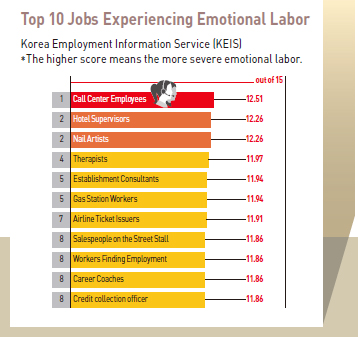
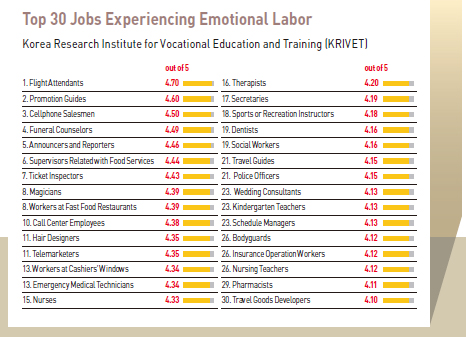
Mental and Physical Pain of Emotional Labor
As we mentioned above, emotional labor has a lot to do with the service industry and the ones who suffered most are the workers in the service industry clusters. The UOS Times investigated data of the occupational clusters that suffered the most emotional labor. According to the data (below the text) from Korea Employment Information Service (KEIS) and Korea Research Institute for Vocational Education and Training (KRIVET), which are dealing with the jobs that suffer the most from emotional labor, all the clusters in the charts are professions in the service industry. Two representative professions in the service industry, call center employees and therapists, are commonly ranked in both charts.
These employees in the service industry are experiencing emotional labor. According to The Kyunghyang Shinmun, about 40 percent of all workers in Korea have to treat customers with kindness despite customers’ rude behaviors. This emotional labor accompanies more serious mental pain. According to research from Wonjin Institute of Occupational and Environmental Health on 3,096 emotional laborers, 26.6 percent of them had depression to a the degree that needed psychological counseling. This rate was similar with the rate of depression in the workers who were dismissed with punishment, 28.5 percent.
Moreover, some emotional laborers are suffering from sleeping disorders or victim mentality. According to an announcement of The Seoul Institute about the difficulties of emotional laborers in public areas in Seoul, 50.9 percent of emotional laborers experience sleeping disorders twice a week and think that people hate them once a week. Their satisfaction degree of working lives was relatively low, 45.5 out of 100.
Some workers even feel suicidal due to emotional labor. According to the research from the College of Medicine in Yonsei University, emotional laborers feel suicidal about two times more than workers who do not experience emotional labor. Especially, if the emotional laborers are not guaranteed autonomy in working, they feel suicidal maximally 4.6 times more than workers in an opposite condition.
Physical pain caused by emotional labor is not exceptional. Some of the emotional workers suffer from chronic headaches and stomachaches, or heart palpitations. They also often experience blushing of their faces or paralysis of their facial muscles. According to Yang So-young, a psychology consultant, people who undergo severe emotional labor could become addicted to drugs, alcohol, sex or gambling. She said that those addictions are a sort of evasion from relationships with other people.

Interviews with People Experiencing Emotional Labor
The UOS Times selected a call center employee of an anonymous company and a nail artist as examples of occupations experiencing emotional labor and interviewed with them to know about their experiences and pain, in depth.
A call center employee said: “The number of people who make unreasonable demands and verbal violence is few, but those small numbers’ wrongful acts are so stressful. Such rude people believe that they can act as they want because it is just a call not a face-to-face situation. For example, a man told me that he wanted to subscribe for mobile phone services using his wife’s name without verifying her identification. So, I refused his demands under the policies in our company. However, he consistently pushed his demands, insulting my personality and even made sexually harassing comments to me.” At that time, “I got so nervous that my heartbeat raced and I could not control my emotions,” she said. Furthermore, “there are no specific age groups or gender doing rude behavior to workers. Many people may think that rude customers are mainly middle-age men. However, even teenagers sometimes use verbal violence to us,” she added.
During our interview with a nail artist, the interviewee also explained specific situations, which involve emotional labor stress. She said that once a man felt her work with a woman’s touch and continuously demanded her to touch his hand even after finishing the nail care. But, she could not express her actual emotions because she was so embarrassed with his action. “Some people think that we became nail artist because we were not good at studying and ignore us for it, nonetheless nail artists are in a professional field and we are doing this work for our professional pleasure,” she said.
Both interviewees said that “Improving the recognition for jobs in the service sector is positively necessary. If this improvement is not seen in our society, we will continuously suffer from such negative prejudice and behavior against us.”

Counselor’s Advice to People Doing Emotional Labor
According to our interview with Yang So-young, a psychology consultant, she said, “The most important thing is to develop your inner strength to deal with other people bravely. If you don’t have a firm, strong mind to deal with customers, you could hurt yourself due to work stress and decreased self-esteem from misbehaviors of customers.”
She recommended three strategies for workers on treating customers, as these strategies are also based on a firm mind of workers. Firstly, positive thinking is recommended as a very effective method for preventing emotional exhaustion. For example, if a customer gets indignant based on unreasonable reasons, you need to think, “This customer may have difficulties in other things. So the customer has no direct intention to insult me at all.” Secondly, replying sternly to customer’s demand while sympathizing with their feelings is also important to deal with customers. She said, in doing so, customers do not ignore the workers and do not make unfair demands anymore. Finally, having more responsibility for work is recommended.
Yang advised workers to meet a lot of people to relieve the stress of work and to visit the counseling center. She said, “Building relationships with other people who can share your pains has a beneficial influence on forming a strong mind. If you don’t have such people to share your problems with, come to the counseling center without hesitation and share your troubles with us.”
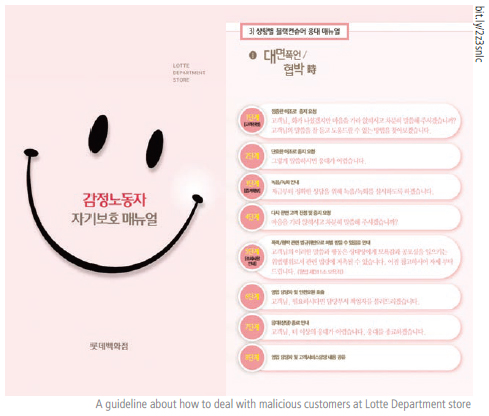

Solution to the Problem
Change in the fundamental perception of our society is essential to solve this problem. If our perception does not change, pains of emotional workers will last forever.
Recently the winds of change are blowing in several companies, as mass media has reported the importance of concerning for emotional labor. Some companies have realized the importance of this problem and sought for measures for workers. According to our interviewee from the call center, workers received a guideline about how to deal with malicious complaints. Furthermore, they said, “Recently, the company has protected us, as we can use the right to put the phone down instantly when hearing abusive language or threats from customers. This protection policy is great help to us.”
Another example is GS Caltex Corporation. They replaced existing machine ringtones with voices of people who are family of call center workers. This ringtone with the voice of a call center worker’s daughter says, “Mom I love the most in the world, will counsel for you.” Even if a customer is so rude, their bombardment of rough words won’t affect you like before.
We should know that the perception of “customer is king” is very wrong and should not think of this perception as a universal one. Unlike eastern countries, a perception of “a customer who uses a service is completely equivalent to a worker” is deeply rooted in western countries. Westerners think that the money they pay does not include the extra effort of workers. In other words, they think that the price only included the product and initial service, not the additional effort of workers. Thus, they express their respect to workers by giving a tip additionally. We need to make an example of this perception.
You may think that you are not a rude customer. Probably you do not throw money to the worker in convenience stores and do not talk rudely to restaurant staff. Of course, most would not. However, emotional labor exists in situations of our daily lives. We maybe unconsciously force kindness and politeness from them. Now, we need to respect their emotions as themselves, and understand their difficulties. They are also people who can laugh for good things and cry for sad things. They are not ATMs that we can treat like machines with no feelings. If we genuinely sympathize with their actual feelings and pains, our society can take a step forward.
Hong Sol-eui
solly5656@uos.ac.kr
Jung Myoung-jun
jmj9999@uos.ac.kr

